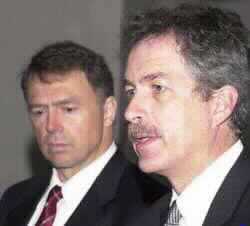- Author:
& News Agencies - Section:
WORLD HEADLINES
- Hajj & Umra WORLD HEADLINES
US envoy Burns launches Mideast tour as Washington lashes Israel

US envoy William Burns met Egyptian President Hosni Mubarak at the start of a two-week Middle East tour aimed at jump-starting the moribund peace process, as the United States stepped up the pressure on Israel over the deaths of Palestinian civilians.Washington leaned on Israel to rein in its military tactics hours before Burns held talks with Mubarak and his political advisor Osama al-Baz, joining a chorus of global outrage over Israel's killing of six Palestinian civilians during an Israeli raid in the southern Gaza Strip.
"We are deeply concerned by reports that civilians and children were among those killed and injured" during the raid in the southern Gaza Strip town of Rafah, said Anne Marks, a State Department spokeswoman.
"The government of Israel should formally investigate the circumstances of these incidents, review its procedures and should take all appropriate measures to avoid civilian casualities in their operations," she said.
Six Palestinians, including two elderly women and two children, were killed in Rafah on Thursday when Israeli tanks shelled the town after coming under rocket fire, sparking international outrage over what was deemed an excessive use of force.
The bloodshed pulled the rug out on Israeli Prime Minister Ariel Sharon as he finished a two-day visit to Washington where he and US President George W. Bush reviewed both US plans for Iraq and the timeline for reviving the peace process after two-years of blooshed.
The Israeli press reported US Secretary of State Colin Powell had demanded an explanation from Sharon as news broke of Rafah. However, Israel's ambassador to Washington Danny Ayalon denied on Israeli public radio that the matter had been raised at all.
The army's operations came under careful scrutiny at home, with top-selling Yediot Aharanot compiling a list of 48 Palestinian civilians killed by Israel since June.
But even as Sharon's hawkish government defended the army, Israel took some minor steps aimed at easing the harsh living conditions in the West Bank where a four-month reoccupation by Israel has given rise to fears of a looming humanitarian crisis.
In a nod to Washington, the army lifted its daytime curfew on Jenin, but also dug trenches around the northern West Bank town and kept it surrounded so no one could leave. The military had already lifted the curfew earlier in the week only to slap it back down again.
Public radio, meanwhile, said Sharon was to hold intense security discussions Sunday on the withdrawal of troops from the southern West Bank town of Hebron, a move requested by Washington that has long been on the table and repeatedly delayed.
Such measures might aid Burns' trip as Washington repeatedly has come under fire in the Arab world for being blatantly pro-Israeli.
Bush said Wednesday, after meeting with Sharon, that he was sending Burns, Assistant Secretary of State for Near East Affairs, back to the region to try to revive negotiations after two years of bitter fighting which has no end in sight.
His trip comes just as Palestinian leader Yasser Arafat is to unveil a new cabinet line-up to meet demands from United States and Israel -- as well as his own people -- that the Palestinian Authority clean up its act.
Egypt's government-run daily Al-Ahram wrote Friday Burns and Mubarak were set to discuss "the US vision for the creation of a Palestinian state," as well as Cairo's opposition to an invasion of Baghdad.
The trip also comes as Washington, supported by London, is making diplomatic efforts to push fellow UN Security Council members to adopt a resolution threatening Iraq with military action if it hinders access to suspected weapons sites.
Most of the countries on Burns's itinerary are deeply opposed to the military option against Iraq and some have warned of an explosion of Middle East anger and violence should it occur.
His 12-nation tour takes in Egypt, Saudi Arabia, Syria, Lebanon, Israel and the West Bank, Yemen, Oman, the United Arab Emirates, Qatar, Bahrain and Kuwait.
To lay the groundwork for his trip, Burns met on Thursday and Friday in Paris with representatives from the so-called Quartet -- Russia, the United States, the European Union and the United Nations -- trying to unblock the Middle East peace process.
They discussed a US-backed roadmap for ending the Israeli-Palestinian conflict initially drawn up by the Quartet last month.
The plan prescribes a three-step process for the creation of a Palestinian state by 2005, beginning with an end to the violence, and will be one of the things Burns will be trying to sell on his tour.
PHOTO CAPTION
Chief U.S. mediator in the Middle East, Assistant Secretary of State William Burns, starts a two-week trip to the region October 18 after a stop in Paris to consult with fellow mediators, a State Department official said October 16, 2002. Burns, who will go on to Egypt, Saudi Arabia, Syria, Lebanon, Israel, the West Bank, Yemen, Oman, the United Arab Emirates, Qatar, Bahrain and Kuwait, is seen with U.S. Ambassador to Kuwait Richard H. Jones (L), on January 12 in Kuwait. Photo by Stephanie Mcgehee/Reuters
Related Articles
 Hajj virtues
Hajj virtues
-
School of Faith in Ten Days of Thul-Hijjah
The believing human self needs strong provocations in order to awaken whenever it is enveloped by laziness in...
-
The Status of Hajj in Islam
Hajj is the fifth pillar of Islam; Allah, The Exalted, ordained it in the ninth year after Hijrah (the Prophet's,...
-
School of Faith in Ten Days of Thul-Hijjah
The believing human self needs strong provocations in order to awaken whenever it is enveloped by laziness in relation...


 Home
Home Discover Islam
Discover Islam Quran Recitations
Quran Recitations Lectures
Lectures
 Fatwa
Fatwa Articles
Articles Fiqh
Fiqh E-Books
E-Books Boys & Girls
Boys & Girls  Hajj Rulings
Hajj Rulings Hajj Fatwas
Hajj Fatwas












